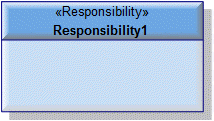Responsibility (UPDM - DoDAF aliases)

Creation
To create a Responsibility:
• From an
Architectural Description or
Service Description: right-click the Architectural Description or Service Description, point to New, point to DoDAF, point to Operational, and then click Responsibility.
• From a
Responsibility: right-click the Responsibility, point to New, point to DoDAF, and then click Responsibility.
• From an
OV-4 Typical Organizational Relationships Chart,
SV-1 Systems Interface Definition,
SV-4 Systems Functionality Hierarchy,
SV-5 Function to Operational Activity/Service Function Definition or
SV-9 Systems Technology and Skills Forecast Definition: click the  Responsibility button, and then click in free space on the diagram.
Responsibility button, and then click in free space on the diagram.
 Responsibility button, and then click in free space on the diagram.
Responsibility button, and then click in free space on the diagram.Appearance
When shown on an
OV-4 Typical Organizational Relationships Chart,
SV-1 Systems Interface Definition,
SV-4 Systems Functionality Hierarchy,
SV-5 Function to Operational Activity/Service Function Definition or
SV-9 Systems Technology and Skills Forecast Definition, a Responsibility appears as follows:

When shown on an
SV-1 Systems Interaction Specification or
SV-2 Systems Resource Flow Description, a Responsibility appears as follows:

Relationships
The following relationships are of importance to a Responsibility:
• UML Generalizations define Responsibility inheritance (
SV-1 Systems Interface Definition).
•
Implements relationships link a Responsibility to the
Performer (Operational) elements it implements.
•
Activity Performed by Performer relationships to link a Responsibility to the
Activity (System) elements that can be performed by the Responsibility.
•
Required Skill and
Typical Skill Of Person Role Type relationships link the Responsibility to the
Skill elements that are required or provided by that Responsibility.
• Used as a conveyed classifier for
Operational Exchange elements.
The following sections provide information about how a Responsibility is used in the model.
Create a Responsibility from
Create from a Responsibility
In addition to the UPDM elements that can be created from all UPDM elements (
Representation,
Definition,
Information, and
Metadata):
Shown on these diagrams, tables and matrices
In addition to the
AV-2 Integrated Dictionary and
StdV-1 Standards Profile, which can show all UPDM elements:
UPDM writeable properties
The following writeable properties are available on the Responsibility tab of a Responsibility element's Property Pages:
• isEncapsulated
• URI
































